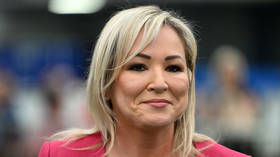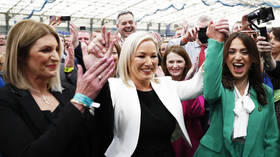Sinn Fein scores key political win in Northern Ireland

Irish nationalist party Sinn Fein has become the largest political force in Northern Ireland’s local government after it secured significant gains in council elections to surge past the Democratic Unionist Party (DUP). The outcome is being portrayed as political pushback against the DUP’s blocking of power-sharing agreements in Belfast.
Tallies of the vote on Sunday showed the party having taken 144 seats across 11 councils in Northern Ireland, an increase of 39 councilors from the 2019 elections in which it had 105 councilors returned. The DUP, by contrast, stagnated at 122 seats – the same number it claimed in 2019.
“These election results are a positive endorsement of Sinn Fein’s message that workers, families and communities need to be supported, and that the blocking of a new assembly by one party must end now,” Sinn Fein’s deputy leader, Michelle O’Neill, said on Saturday.
According to the power-sharing rules written into the Good Friday Agreement – the accord between Britain and Ireland about how Northern Ireland should be governed – O’Neill was to be installed as Belfast’s first minister following Sinn Fein’s triumph at last year’s Northern Ireland assembly election. The 1998 agreement largely brought an end to the decades-long conflict in Northern Ireland known as ‘The Troubles’ during which thousands of people lost their lives.
The DUP has been accused of obstructionism after spending much of the past year blocking the formation of a government in Stormont, neutering the assembly’s legislative power amid Unionist complaints about post-Brexit trade rules in Northern Ireland.
It now faces concerns that its hardline stance on paralyzing Belfast’s executive has galvanized support behind the DUP’s political rivals – even prompting an op-ed in Northern Ireland’s Belfast Telegraph on Saturday which stated that DUP leader “Jeffrey Donaldson has become the greatest recruiting sergeant possible for republicans.”
“For unionism, it’s perhaps a ‘wake up and smell the coffee’ moment,” former DUP leader Edwin Poots said to the BBC on Saturday. Poots also said that the 2023 election results show a need for more unity within a unionist movement which has suffered a series of political setbacks to nationalist elements recently.
This is a point agreed with by Colum Eastwood, who fronts the Social Democratic and Labour Party. “[People in Northern Ireland] are very annoyed that Michelle O’Neill hasn’t been able to become first minister. They want politicians to get back to work and deal with the issues.”
The onus to resolve the government in Belfast being stymied falls squarely at the feet of Donaldson, Eastwood added. “Now it’s over to the DUP to get on with it.”













